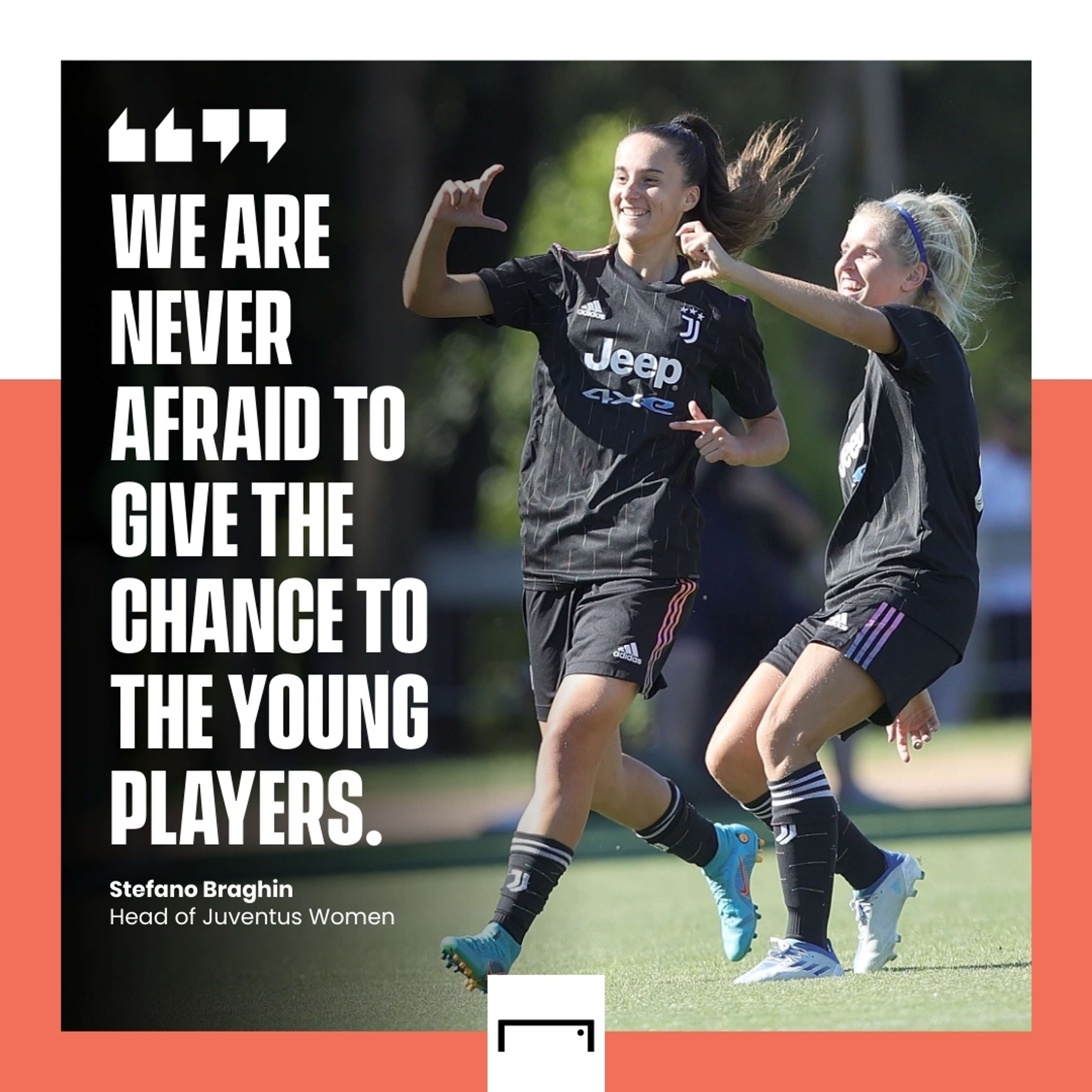Just three girls turned up for Juventus' first open day in 2015 – and one of those was wearing a pair of flip flops.
Fast forward seven years and Juventus is the most dominant side in Italian women’s football.
The first team formed in 2017, two years after the federation made it mandatory for clubs in Serie A to have female academies, and has won all five league titles it has competed for.
The Bianconere have also lifted two Coppa Italia trophies and claimed the Supercoppa Italiana on three occasions.
This past season, Joe Montemurro masterminded a domestic treble, as well as leading Juve to the last eight of the Champions League – both historic firsts.
But it’s not just the present that looks good. A few more populous open days later and Juventus' academy is arguably the best in the country.
In fact, when Italy takes part in the UEFA Women's Under-19 Championship in June, no club will be better represented. In qualifying, 21 of the team’s 26 goals were scored by those coming through the system in Turin.
Stefano Braghin, head of Juventus Women, laughs when he recalls that first open day with just three attendees but is quick to point out that it was a landmark occasion nonetheless.
"It all started from there and now we have more or less 200 young players, in nine teams from Under-9s to Under-19s," he tells GOAL.
"All the categories are in some way covered. That means a lot after just seven years.”
Juve's rapid rise to prominence is made all the more impressive by the fact that Piedmont, where Turin sits, is not an easy region in which to recruit players.
Furthermore, attitudes towards the women's game within Italy have only started to shift very recently. The number of girls playing the game is extremely low as a result, particularly in comparison to other countries.
“In the younger categories, we still need to make quantity,” says Braghin, who spent six years running the men’s academy before switching to Juve's women’s side in 2018.
“We cannot waste players, at least not at the very beginning of their pathway. So, from [age] nine to 12 or 13, we really try to recruit everyone who is keen to play in the club.
“But, on the other hand, starting from 14 years old, what we would like to do is to raise the quality of the groups, and we started last season having some relationships with local teams. Maybe the players that are not good enough for Juventus might be good for them.
“Here, we try to have very limited groups with quality as high as possible. This is the idea because now we start competing at quite a high level with the first team.”
To raise that quality, Juventus has had to get creative.
“Usually, our teams, especially in the regional competitions, win 20-0,” Braghin says.
“So, what we did is, the under-15s play the under-17 championship, and the under-17s play the men's under-15s championship. Our under-16s group is currently playing a men's competition, too.”
 Getty/GOAL
Getty/GOALCan you see the impact?
“100 per cent,” Juve’s head of women’s football replies before GOAL can even finish the question, “especially in terms of intensity and strength.
"But the biggest thing I've noticed is that you can play quicker and you have to take decisions quicker because of the pressure that you're not used to.”
The end product is some of the most exciting talents in Italian women’s football. Alice Giai, Alice Berti, Elisa Pfattner, Nicole Arcangeli and Chiara Beccari are among the teenagers to keep an eye on, all making their senior debuts in the last two seasons.
“The player that has made the most appearances in Juventus is Arianna Caruso, who is 22 years old,” Braghin adds. “She started playing here at 17. We are never afraid to give the chance to the young players.
“The first game of the [2021-22] Champions League against Servette in Geneva, we had eight players under 23 on the pitch. For a very new team, it's not bad.”
With Juventus driving Italian women’s football forward, these numbers will only get bigger and better. After the Bianconere’s establishment of a women’s team in 2017, giants like Roma, Inter and Milan have all followed suit.
That’s improving the quality of Serie A and also the national team, which reached the quarter-finals of the World Cup in 2019.
That was pivotal in the progress of the game in Italy not only at the highest level, but lower down, too, resulting in a noticeable increase in girls playing football.
“The numbers are growing very fast, to be honest,” Braghin notes. “Now, we have to be good as a system to keep the standards high and let them grow very fast as players.”
Professionalism in women’s football will be introduced next season in Italy, which Braghin hopes will overcome natural challenges to bring “sustainability” as well as further “development”.
That will come after the national team has another chance to capture the attention of a nation at this summer’s Women’s Euros.
There are still things that need to improve across the board and obstacles that are not so quick or easy to conquer.
Braghin highlights the importance of coaches to be “formed mentally and technically for coaching girls”, which is rare in Italy because “you don't really have a generation of women's coaches”.
Juventus, as a club, has aims and ambitions to expand the facilities and opportunities it gives the young girls coming through the club, too.
But if the first seven years are anything to go by, there are plenty of reasons to be optimistic not only in Turin, but across the whole country, as the Bianconere continue to set the standard for the rest of Italy to follow.
“This is a football country at the end of the day,” Braghin adds. “When you offer something good and something that people can rely on, I think it's not difficult in Italy to have people playing football.
"What they missed was the right situation to do that. This is a very Catholic, old-style country so consider that maybe the prejudice against women's football was still very strong.
“Playing football in an environment [such as Juventus], in such a club, probably removes most of the prejudice of the people – then, the numbers go up very fast.”
Nothing illustrates that quite like going from three girls at an open day to 200 in an academy as quickly as Juventus have.
